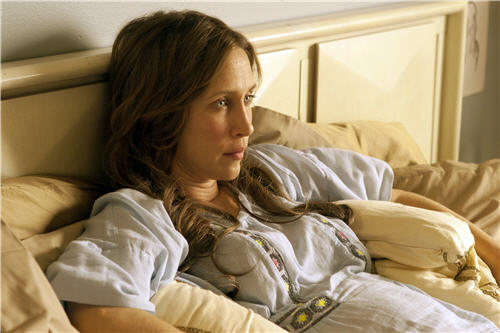Review: Higher Ground

Films using faith as a plot device usually end up in one of three distinct camps: provocative, condescending or dogmatic. Vera Farmiga's directorial debut Higher Ground instead embodies the faltering journey of someone trying to embrace faith despite undergoing a spiritual crisis, and the ripples her actions cause in an otherwise serene community in the 1970s.
As a young girl, Corinne was already seeking spiritual enlightenment. As a young woman, her plans get sidetracked by musician Ethan, derailing plans to be a writer. As a wife and mother, Corinne (Farmiga) embraces a "Jesus Freak" lifestyle, content to raise her children and be active in her tight-knit community. Her idyllic life begins to chafe as her spirited best friend Annika (Dagmara Dominczyk) professes the deep connection to God that Corrine lacks, and a schism widens between Corrine and her husband (Joshua Leonard).
Higher Ground is a challenging movie, as its vignette-based structure may highlight significant moments in Corrine's life, although they are not all equally enlightening to Corrine's inner life. But together, they reveal a burgeoning discontent with the complacency required of her, like many women during that time who discovered their choices were not as liberating as they seemed.
Based on This Dark World, a memoir by Carolyn Briggs, Higher Ground doesn't focus on conventional stereotypes while tackling Christian spirituality. But the movie doesn't involve as dramatic a re-awakening as the ones shown in Paradise Recovered, the farce of Screen Door Jesus or the darkly comic Forgiving the Franklins. It's more a quiet study of relationships and doubts and liberation, with the occasional, distracting fantasy shots that are less distracting and more effective in the highly imaginative Eve and the Fire Horse.
The casting is outstanding, even if occasionally wasted. McKenzie Turner and Farmiga's younger sister Taissa Farmiga play Corrine as a younger child and teen respectively, with the younger Farmiga's eerie resemblance to her older sister a bit distracting. John Hawkes (a former Austin resident) may have a small part as Corinne's father, but his scenes are so few there's no time to relate to his character, although he has a particularly moving scene with Donna Murphy, who plays her mother.
Farmiga herself is particularly effective as the cerebral Corinne, who is at times selfish and yet so giving, as she slowly builds to the point where she finds new outlets for her self-expression, something that's been subliminated by the choices she has made. Farmiga's strength as an actor has always been her subtlety, which serves her well in Higher Ground. But it's Dominczyk who steals every scene she's in, challenging Corrine's notions of faith and devotion, as well as catalyzing Corrine to stop questioning and start acting.
Higher Ground is not an easy movie, nor is it perfect. It doesn't try to wrap anything up neatly or resolve the conflicts in Corinne's life. It's not an easy film to like. But for those who are questioning their own spirituality, Higher Ground is a must-see film that will prompt a lot of discussion after the credits end.

